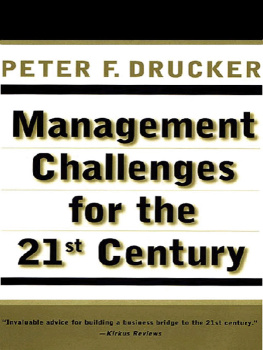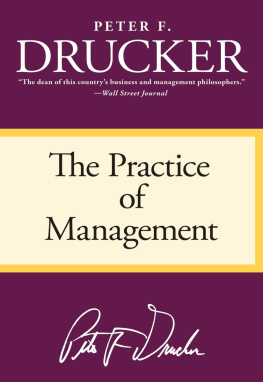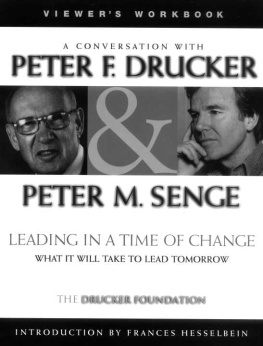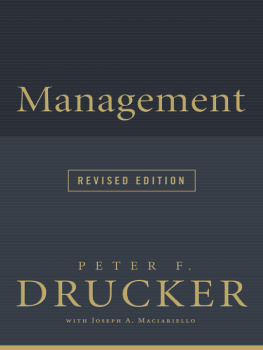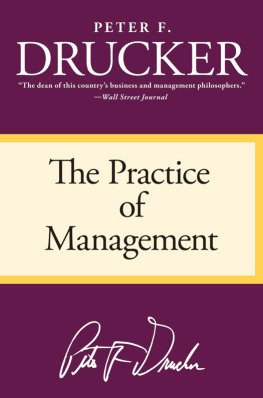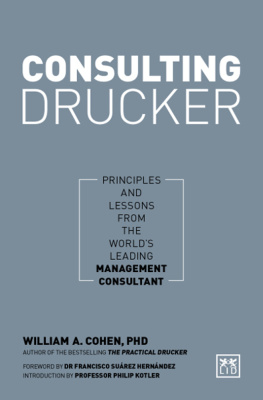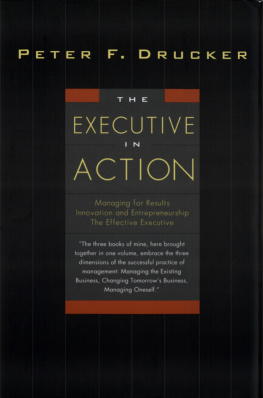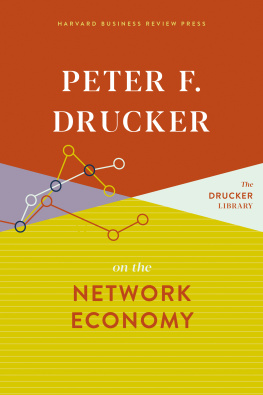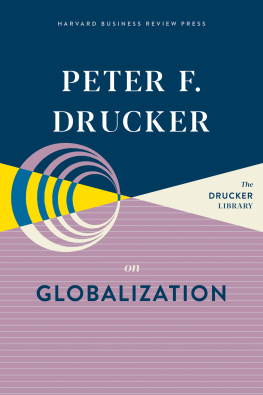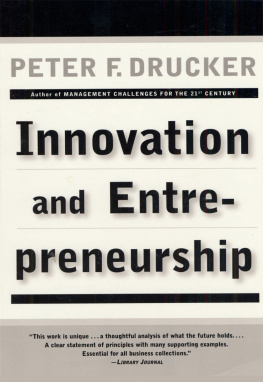Drucker - Management Challenges for the 21st Century
Here you can read online Drucker - Management Challenges for the 21st Century full text of the book (entire story) in english for free. Download pdf and epub, get meaning, cover and reviews about this ebook. year: 2014, publisher: HarperCollins e-Books, genre: Business. Description of the work, (preface) as well as reviews are available. Best literature library LitArk.com created for fans of good reading and offers a wide selection of genres:
Romance novel
Science fiction
Adventure
Detective
Science
History
Home and family
Prose
Art
Politics
Computer
Non-fiction
Religion
Business
Children
Humor
Choose a favorite category and find really read worthwhile books. Enjoy immersion in the world of imagination, feel the emotions of the characters or learn something new for yourself, make an fascinating discovery.
Management Challenges for the 21st Century: summary, description and annotation
We offer to read an annotation, description, summary or preface (depends on what the author of the book "Management Challenges for the 21st Century" wrote himself). If you haven't found the necessary information about the book — write in the comments, we will try to find it.
Drucker: author's other books
Who wrote Management Challenges for the 21st Century? Find out the surname, the name of the author of the book and a list of all author's works by series.
Management Challenges for the 21st Century — read online for free the complete book (whole text) full work
Below is the text of the book, divided by pages. System saving the place of the last page read, allows you to conveniently read the book "Management Challenges for the 21st Century" online for free, without having to search again every time where you left off. Put a bookmark, and you can go to the page where you finished reading at any time.
Font size:
Interval:
Bookmark:


Tomorrow's Hot Issues
Where, readers may ask, is the discussion of COMPETITIVE STRATEGY, of LEADERSHIP, of CREATIVITY, of TEAMWORK, of TECHNOLOGY in a book on MANAGEMENT CHALLENGES? Where are the HOT ISSUES OF TODAY? But this is the very reason why they are not in this book. It deals exclusively with TOMORROWS Hot Issuesthe crucial, central, life-and-death issues that are certain to be the major challenges of tomorrow.
CERTAIN? Yes. For this is not a book of PREDICTIONS, not a book about the FUTURE. The challenges and issues discussed in it are already with us in every one of the developed countries and in most of the emerging ones (e.g., Korea or Turkey). They can already be identified, discussed, analyzed and prescribed for. Some people, someplace, are already working on them. But so far very few organizations do, and very few executives. Those who do work on these challenges today, and thus prepare themselves and their institutions for the new challenges, will be the leaders and dominate tomorrow. Those who wait until these challenges have indeed become hot issues are likely to fall behind, perhaps never to recover.
This book is thus a Call for Action.
These challenges are not arising out of today. THEY ARE DIFFERENT. In most cases they are at odds and incompatible with what is accepted and successful today. We live in a period of PROFOUND TRANSITIONand the changes are more radical perhaps than even those that ushered in the Second Industrial Revolution of the middle of the 19th century, or the structural changes triggered by the Great Depression and the Second World War. READING this book will upset and disturb a good many people, as WRITING it disturbed me. For in many casesfor example, in the challenges inherent in the DISAPPEARING BIRTHRATE in the developed countries, or in the challenges to the individual, and to the employing organization, discussed in the final chapter on MANAGING ONESELFthe new realities and their demands require a REVERSAL of policies that have worked well for the last century and, even more, a change in the MINDSET of organizations as well as of individuals.
This is a MANAGEMENT BOOK. It intentionally leaves out BUSINESS CHALLENGESeven very important ones such as the question of whether the EURO will displace the U.S. dollar as the worlds key currency, or what will SUCCEED the 19th centurys most successful economic inventions, the commercial bank and the investment bank. It intentionally does not concern itself with ECONOMICSeven though the basic MANAGEMENT changes (e.g., the emergence of knowledge as the economys key resource) will certainly necessitate radically new economic theory and equally radically new economic policy. The book does not concern itself with politicsnot even with such crucial questions as whether Russia can and will recover as a political, military and economic power. It sticks with MANAGEMENT ISSUES.
There are good reasons for this. The issues this book discusses, the new social, demographic and economic REALITIES, are not issues that GOVERNMENT can successfully deal with. They are issues that will have profound impact on politics; but they are not political issues. They are not issues the Free Market can deal with. They are also not issues of ECONOMIC THEORY or even of ECONOMIC POLICY. They are issues that only MANAGEMENT and the INDIVIDUAL knowledge worker, professional or executive can tackle and resolve. They are surely going to be debated in the domestic politics of every developed and every emerging country. But their resolution will have to take place within the individual organization and will have to be worked out by the individual organizations MANAGEMENTand by every single individual knowledge worker (and especially by every single executive) within the organization.
A great many of these organizations will, of course, be businesses. And a great many of the individual knowledge workers affected by these challenges will be employees of business or working with business. Yet this is a MANAGEMENT book rather than a BUSINESS management book. The challenges it presents affect ALL organizations of todays society. In fact, some of them will affect nonbusinesses even more, if only because a good many nonbusiness organizationsthe university, for instance, or the hospital, let alone the government agencyare more rigid and less flexible than businesses are, and far more deeply rooted in the concepts, the assumptions, the policies of yesterday or even, as are universities, in the assumptions of the day before yesterday (i.e., of the 19th century).
How to use the book? I suggest you read a chapter at a timethey are long chapters. And then first ask: What do these issues, these challenges MEAN for our organization and for me as a knowledge worker, a professional, an executive? Once you have thought this through, ask: What ACTION should our organization and I, the individual knowledge worker and/or executive, take to make the challenges of this chapter into OPPORTUNITIES for our organization and me?
AND THEN GO TO WORK!
Peter F Drucker
Claremont, California
New Years Day 1999
Management's
New Paradigms
Why Assumptions Matter Management Is Business Management The One Right Organization The One Right Way to Manage People Technologies and End-Users Are Fixed and Given Managements Scope Is Legally Defined Managements Scope Is Politically Defined The Inside Is Managements Domain
BASIC ASSUMPTIONS ABOUT REALITY are the PARADIGMS of a social science, such as management. They are usually held subconsciously by the scholars, the writers, the teachers, the practitioners in the field. Yet those assumptions largely determine what the disciplinescholars, writers, teachers, practitionersassumes to be REALITY.
The disciplines basic assumptions about reality determine what it focuses on. They determine what a discipline considers facts, and indeed what it considers the discipline itself to be all about. The assumptions also largely determine what is being disregarded in a discipline or is being pushed aside as an annoying exception. They decide both what in a given discipline is being paid attention to and what is neglected or ignored.
A good example is what happened to the most insightful of the earlier management scholars: Mary Parker Follett (18681933).* Because her assumptions did not fit the realities which the budding discipline of management assumed in the 1930s and 1940s, she became a nonperson even before her death in 1932, with her work practically forgotten for twenty-five years or more. And yet we now know that her basic assumptions regarding society, people and management were far closer to reality than those on which the management people then based themselvesand still largely base themselves today.
Yet, despite their importance, the assumptions are rarely analyzed, rarely studied, rarely challengedindeed rarely even made explicit.
For a social discipline such as management the assumptions are actually a good deal more important than are the paradigms for a natural science. The paradigmthat is, the prevailing general theoryhas no impact on the natural universe. Whether the paradigm states that the sun rotates around the earth or that, on the contrary, the earth rotates around the sun has no effect on sun and earth. A natural science deals with the behavior of OBJECTS. But a social discipline such as management deals with the behavior of PEOPLE and HUMAN INSTITUTIONS. Practitioners will therefore tend to act and to behave as the disciplines assumptions tell them to. Even more important, the reality of a natural science, the physical universe and its laws, do not change (or if they do only over eons rather than over centuries, let alone over decades). The social universe has no natural laws of this kind. It is thus subject to continuous change. And this means that assumptions that were valid yesterday canbecome invalid and, indeed, totally misleading in no time at all.
Font size:
Interval:
Bookmark:
Similar books «Management Challenges for the 21st Century»
Look at similar books to Management Challenges for the 21st Century. We have selected literature similar in name and meaning in the hope of providing readers with more options to find new, interesting, not yet read works.
Discussion, reviews of the book Management Challenges for the 21st Century and just readers' own opinions. Leave your comments, write what you think about the work, its meaning or the main characters. Specify what exactly you liked and what you didn't like, and why you think so.

